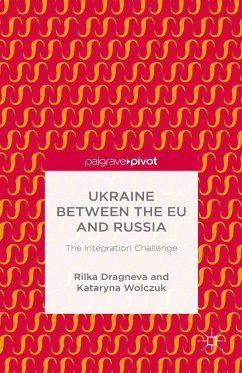
Dimitar Bechev
eBook, PDF
Constructing South East Europe (eBook, PDF)
The Politics of Balkan Regional Cooperation

PAYBACK Punkte
20 °P sammeln!






Regional cooperation has become a distinctive feature of the Balkans, an area known for its turbulent politics. Exploring the origins and dynamics of this change, this book highlights the transformative power of the EU and other international actors.
Dieser Download kann aus rechtlichen Gründen nur mit Rechnungsadresse in A, B, BG, CY, CZ, D, DK, EW, E, FIN, F, GR, HR, H, IRL, I, LT, L, LR, M, NL, PL, P, R, S, SLO, SK ausgeliefert werden.
DIMITAR BECHEV Research Fellow at the European Studies Centre, St Antony's College, Oxfordm UK. He is the author of the Historical Dictionary of the Republic of Macedonia (2009) and co-editor of Greece in the Balkans (2009) and Mediterranean Frontiers: Borders, Conflict and Memory in a Transnational World (2010). His reviews and articles on Eastern enlargement and the EU neighbourhood policy, the Balkans, Euro-Mediterranean relations, post-communist transitions and ethnopolitics have appeared in journals including the Journal of Common Market Studies, East European Politics and Societies, Slavic Review, Millennium, and Nationalities Papers. He has also been involved as Region Head for Central and Eastern Europe in Oxford Analytica, a leading provider of political and economic insight.
Produktdetails
- Verlag: Palgrave Macmillan UK
- Seitenzahl: 214
- Erscheinungstermin: 15. März 2011
- Englisch
- ISBN-13: 9780230306318
- Artikelnr.: 45963113
"This is simply the best book out there on the Balkans' recent rebranding into Southeast Europe. Bechev has a point to make - that identity politics in the Balkans can also rhyme with peaceful cooperation. But in doing so he provides us with a systematic and balanced analysis of the various factors - internal vs external, material vs ideational - that have come into play in bringing about the current state of regional integration in Europe's southeastern corner."
- Kalypso Nicolaidis, Department of Politics and International Relations, University of Oxford, UK
"Bechev's book makes a valuable contribution to the field of regional cooperation in the Balkans and comparative regionalism more broadly. Challenging the dichotomy
- Kalypso Nicolaidis, Department of Politics and International Relations, University of Oxford, UK
"Bechev's book makes a valuable contribution to the field of regional cooperation in the Balkans and comparative regionalism more broadly. Challenging the dichotomy
Mehr anzeigen
of functionalist and ideational approaches, the study convincingly shows that both material incentives and identity politics have been advancing intergovernmental cooperation in the conflict prone Balkan region. The European Union and other external actors have not only pushed the Balkan governments towards economic and security cooperation. They have also legitimized their demands and constrained local opposition by making the commitment to regional cooperation constitutive for becoming part of Europe and the West. This book is highly relevant for understanding the prospects of regionalism in South East Europe and other regions ridden by historical conflicts and political tensions."
- Tanja A. Börzel, Jean Monnet Chair andDirector of the Center for European Integration, Freie Universität Berlin, Germany
"There is no better way to grasp the EU post-national project than to look at it from Europe's geopolitical margins. Bechev's volume documents in a compelling and clear-headed fashion how the Union has wielded its symbolic and material power, in concert with the US and NATO. While this vision of a unipolar Europe in a unipolar world is now waning, Brussels will long be in the business of spreading its norms and practices towards its rediscovered Balkan marches. This book tells us the story, bringing in fascinating historical and conceptual depth to it."
- Ivan Krastev, Chairman of the Centre for Liberal Strategies, Sofia and Fellow at the Institute for Human Sciences in Vienna, Austria
"Bechev's book is the first systematic study of regional cooperation in a region which moves beyond just mapping different regional organizations. Without diminishing the difficulties of regional cooperation in a region plagued by its peripheral position in Europe and numerous bi-lateral disputes, Bechev convinces us that regional cooperation has its merits and is not just a futile imposition by well-meaning great powers or international organizations"
- Florian Bieber, Professor of Southeast European Studies, University of Graz, Austria
"...the book offers a valuable lesson to all those who are still thinking of the Balkans in terms of Great Power politics,intrigues and conspiracies." - Ekaterina Nivoka, Etudes Balkaniques
- Tanja A. Börzel, Jean Monnet Chair andDirector of the Center for European Integration, Freie Universität Berlin, Germany
"There is no better way to grasp the EU post-national project than to look at it from Europe's geopolitical margins. Bechev's volume documents in a compelling and clear-headed fashion how the Union has wielded its symbolic and material power, in concert with the US and NATO. While this vision of a unipolar Europe in a unipolar world is now waning, Brussels will long be in the business of spreading its norms and practices towards its rediscovered Balkan marches. This book tells us the story, bringing in fascinating historical and conceptual depth to it."
- Ivan Krastev, Chairman of the Centre for Liberal Strategies, Sofia and Fellow at the Institute for Human Sciences in Vienna, Austria
"Bechev's book is the first systematic study of regional cooperation in a region which moves beyond just mapping different regional organizations. Without diminishing the difficulties of regional cooperation in a region plagued by its peripheral position in Europe and numerous bi-lateral disputes, Bechev convinces us that regional cooperation has its merits and is not just a futile imposition by well-meaning great powers or international organizations"
- Florian Bieber, Professor of Southeast European Studies, University of Graz, Austria
"...the book offers a valuable lesson to all those who are still thinking of the Balkans in terms of Great Power politics,intrigues and conspiracies." - Ekaterina Nivoka, Etudes Balkaniques
Schließen
Für dieses Produkt wurde noch keine Bewertung abgegeben. Wir würden uns sehr freuen, wenn du die erste Bewertung schreibst!
Eine Bewertung schreiben
Eine Bewertung schreiben
Andere Kunden interessierten sich für











